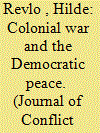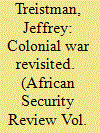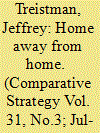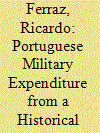| Srl | Item |
| 1 |
ID:
056143


|
|
|
| 2 |
ID:
117648


|
|
|
|
|
| Publication |
2012.
|
| Summary/Abstract |
The Carnation Revolution on 25 April 1974 toppled the authoritarian regime in Lisbon. It is fallacious to conclude, however, that the 1974 coup d'état signaled Portugal's defeat in the Colonial War. The status of each conflict on the eve of the Carnation Revolution varied, and it was by no means inevitable that Portugal would have been defeated in all three theatres had the coup not occurred. This brief research note therefore advances a novel approach to examining the Colonial War by assessing the outcomes prior to the 1974 coup. In particular, the author proposes that Portugal achieved military victory in Angola and Mozambique, but was defeated in Guinea-Bissau.
|
|
|
|
|
|
|
|
|
|
|
|
|
|
|
|
| 3 |
ID:
114864


|
|
|
|
|
| Publication |
2012.
|
| Summary/Abstract |
The aim of this article is to obtain a better understanding of the outcomes of counterinsurgency warfare. It advances the hypothesis that the combined presence of a unified revolutionary force and external sanctuary will significantly increase the chances of victory for insurgents. The variables are tested against Portugal's involvement in the Colonial War, accounting for Portuguese defeat in Guinea-Bissau. The article concludes by extending the hypothesis to the wars in Iraq and Afghanistan, determining that the ability of the United States to succeed in Afghanistan is limited unless it seals the border with Pakistan and weakens the unity of insurgent forces.
|
|
|
|
|
|
|
|
|
|
|
|
|
|
|
|
| 4 |
ID:
184062


|
|
|
|
|
| Summary/Abstract |
Over a period of more than a century and a half (1852–2019), military expenditure in Portugal reached its highest values in the contexts of the Great War (1914–1918) and the Colonial War (1961–1974). In almost every year between these two conflicts, military expenditure was the most important sector within the structure of the Portuguese State. However, with the end of the Colonial War and Portugal’s entry into Democracy, there was a clear shift in this pattern. Since 1975, military expenditure has ceased to be the most important sector of the Portuguese State, and currently plays only a very reduced role, while social spending has today supplanted it as the most significant sector. Through the estimation of a dynamic model, it proved possible to identify some of the positive and negative effects of military spending on the Portuguese economy during the period 1874–2018. These results are a possibility that is supported by the theoretical framework.
|
|
|
|
|
|
|
|
|
|
|
|
|
|
|
|
| 5 |
ID:
089421


|
|
|
|
|
| Publication |
2009.
|
| Summary/Abstract |
John Mueller suggests that we may be reaching a point at which war, as conventionally defined, ceases or nearly ceases to exist in both its international and civil varieties. He assesses the phenomenon and speculates about what this development, should it definitively materialize, might suggest about the various explanations and theories scholars and analysts have preferred to explain the problem of war.
|
|
|
|
|
|
|
|
|
|
|
|
|
|
|
|